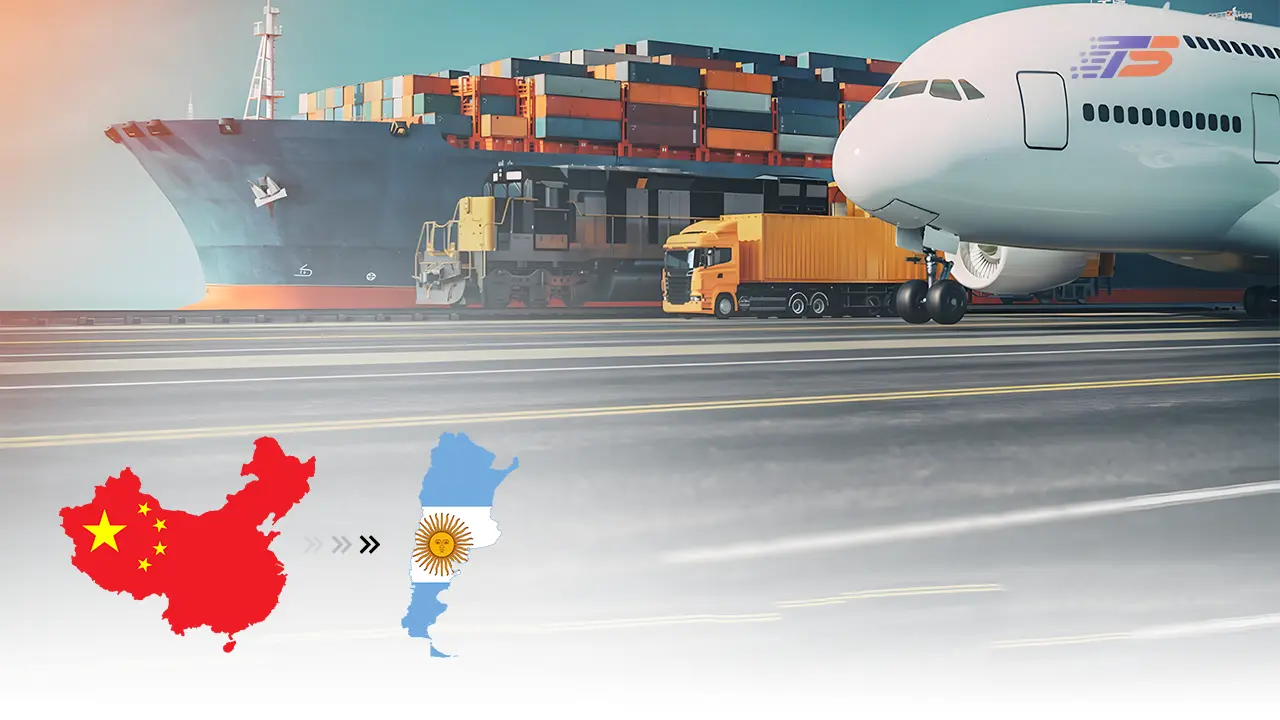Securing reliable shipping from China to Argentina has become essential for B2B importers. In 2024, Argentina imported $11.66 billion in goods from China, creating pressure on businesses to streamline logistics amid long ocean transit times, complex customs, and seasonal capacity shifts. Given that China exports significantly more than Argentina ($9.31 billion versus $5.96 billion), efficient westbound shipping is crucial for importers managing the inventory of electronics, industrial equipment, and automotive components.
Shipping from China to Argentina – Cost & Time Latest Updates 2025
Current market conditions show stabilized rates following seasonal adjustments. B2B importers benefit from improved capacity and reliable transit schedules across all shipping modes.
Costs:
- Air freight (1,000kg+ to Buenos Aires): ~$7.70/kg
- Sea freight (20′ to Buenos Aires): $2,850
- Sea freight (40′ to Buenos Aires): $3,950
- Express courier (small packages): $12-18/kg
Delivery Times:
| Mode | Route | Cost | Transit Time |
| Express | China → Buenos Aires | $12-18/kg | 3-7 days |
| Air Freight | China → Buenos Aires | $7.70/kg (1,000kg+) | 7-8 days |
| Sea Freight | China → Buenos Aires | $2,850 (20′) · $3,950 (40′) | 30-45 days |
Many American businesses employ a dual sourcing strategy – one supplier in South America for faster delivery, and one in Asia for more competitive pricing. If you’re evaluating this approach, comparing Argentina-U.S. freight conditions with the China to US shipping route can help you make a more informed decision about your supply chain diversification.
Complete Shipping Methods to Argentina
Selecting the right shipping method from China to Argentina is crucial for importers. It directly affects delivery reliability, cost efficiency, and overall supply chain performance.
By balancing priorities speed, predictability, or budget businesses can align shipments with operational goals, avoid delays, and keep inventory moving smoothly. Smart choices at this stage build the foundation for efficient logistics.
| Shipping Method | Transit Time | Cost Range | Best For | Key Features |
| Ocean Freight (FCL) | 30-45 days | $2,850-$3,950 | Bulk shipments, inventory restocking | Most cost-effective, various container sizes |
| Ocean Freight (LCL) | 35-50 days | ~$150-300/CBM | Small to medium shipments | Share container space, flexible volumes |
| Air Freight | 7-8 days | $7.70/kg (1,000kg+) | Time-sensitive cargo, high-value goods | Fast transit, reliable schedules |
| Express Courier | 3-7 days | $12-18/kg | Urgent samples, documents, small parcels | Door-to-door service, real-time tracking |
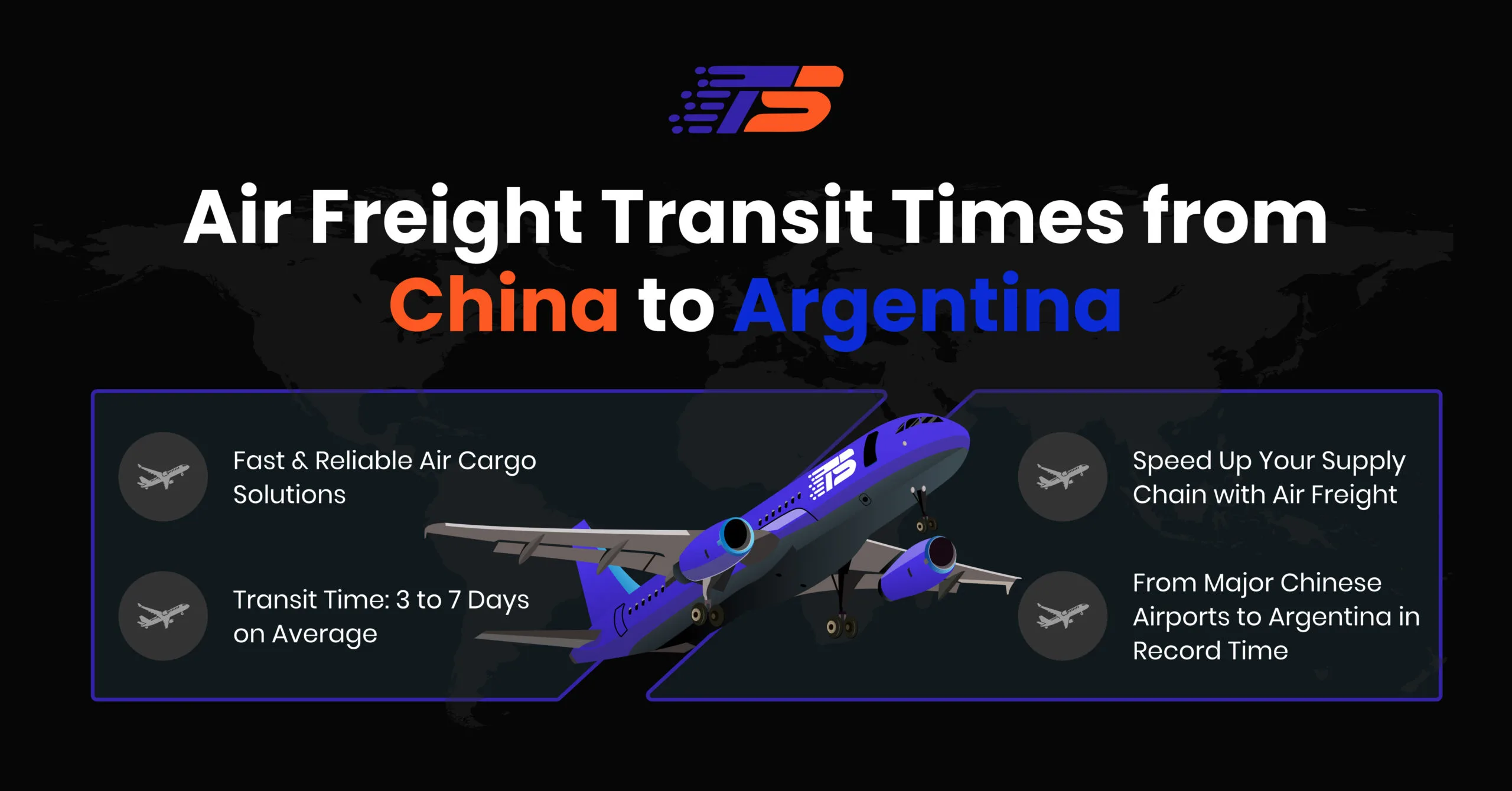
International Door-to-Door Delivery
Door-to-door delivery consolidates the entire shipping process under one service provider, handling everything from Chinese supplier pickup to Argentine customer delivery.
Key Process Steps:
- Origin Pickup: Collection from supplier facilities in manufacturing hubs (Shanghai, Shenzhen, Guangzhou)
- Documentation Management: Commercial invoices, packing lists, certificates of origin prepared for Argentine customs
- Transit & Tracking: Real-time shipment visibility throughout air or sea transport
- Customs Clearance: Local partners handle AFIP registration, duty payments, and import procedures
- Final Delivery: Distribution to Buenos Aires and major Argentine cities with delivery confirmation
Amazon FBA Shipping (China-Argentina)
Amazon FBA shipping requires specialized handling to meet Amazon’s strict receiving standards and delivery schedules at Buenos Aires fulfillment centers.
FBA Requirements:
- Compliance Packaging: FNSKU labeling, poly-bagging, and Amazon guideline adherence
- Inventory Planning: Strategic shipping to avoid long-term storage fees
- Restricted Products: Verification against Amazon’s prohibited items list
- Receiving Coordination: Scheduled delivery to Amazon warehouses
Container Types for Ocean Freight
Ocean freight from China to Argentina requires the right container to ensure cost-effective and secure transport. Specialized containers, such as refrigerated (reefer) units, are suited for perishable goods, and open-top or flat-rack containers accommodate oversized or irregular cargo. Using the appropriate container type helps protect your goods, optimize space, and manage shipping costs effectively.
| Container Type | Internal Dimensions (L × W × H) | Max Volume (CBM) | Best Use Case |
| 20′ Standard (TEU) | 5.90m × 2.35m × 2.39m | 33.2 | Small to medium shipments, automotive parts, electronics |
| 40′ Standard (FEU) | 12.03m × 2.35m × 2.39m | 67.5 | Bulk consumer goods, industrial equipment, textiles |
| 40′ High Cube (40HC) | 12.03m × 2.35m × 2.69m | 76.3 | Light but voluminous cargo, furniture, large machinery |
| 20′ Open Top | 5.90m × 2.35m × 2.39m | 33.2 | Oversized machinery, construction equipment |
| 40′ Open Top | 12.03m × 2.35m × 2.39m | 67.5 | Heavy industrial equipment, project cargo |
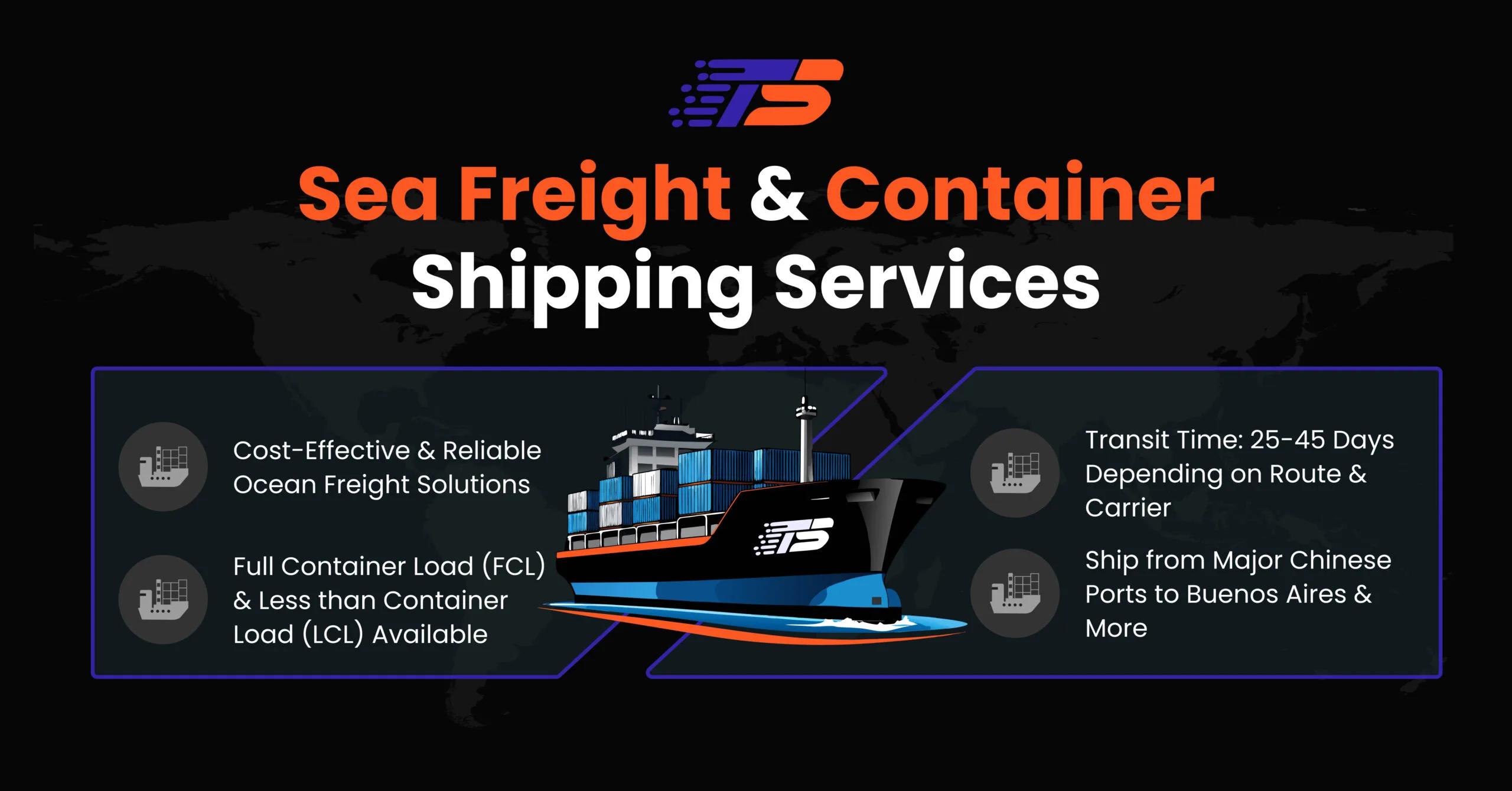
Typical Transit Times for China to Argentina Shipments
B2B importers need accurate transit time expectations to manage inventory planning and customer commitments. Actual delivery times vary based on shipping mode, documentation completeness, and seasonal factors.
| Shipping Method | Transit Time (Port/Airport to Port/Airport) | Customs Clearance & Handling | Total Estimated Delivery Time (Door-to-Door) | Best Suited For |
| Express Courier | 3-5 days | Handled by courier | 3-7 days | Urgent samples, documents, high-value small items |
| Air Freight | 5-7 days | 2-4 days | 7-12 days | Time-sensitive inventory, electronics, fashion goods |
| Sea Freight (FCL) | 30-40 days | 3-7 days | 35-50 days | Bulk shipments, machinery, automotive parts |
| Sea Freight (LCL) | 35-45 days | 5-10 days | 40-55 days | Small to medium volumes, mixed cargo |
Here are the precise ocean freight transit times between Chinese manufacturing hubs and Argentine destination ports. It helps B2B importers to optimize inventory planning and meet customer delivery commitments across different regional markets.
| From → To | Buenos Aires | Rosario | Puerto Madryn | Bahía Blanca |
| Shanghai (CNSHA Port) | 30-40 days | 35-45 days | 40-50 days | 38-48 days |
| Ningbo (CNNGB Port) | 30-40 days | 35-45 days | 40-50 days | 38-48 days |
| Shenzhen (CNSZX Port) | 32-42 days | 37-47 days | 42-52 days | 40-50 days |
| Yantian (CNYTN Port) | 30-37 days | 35-42 days | 40-47 days | 38-45 days |
| Guangzhou (CNGZH Port) | 32-42 days | 37-47 days | 42-52 days | 40-50 days |
| Qingdao (CNQDN Port) | 35-45 days | 40-50 days | 45-55 days | 43-53 days |
Transit Time Factors and Considerations
- Port Congestion: Buenos Aires port experiences seasonal congestion during peak shipping periods (Oct-Feb), adding 3-7 days to transit times
- Documentation Accuracy: Complete and error-free customs paperwork prevents delays; missing information can extend clearance by 5-15 days
- Seasonal Weather: South Atlantic storms during winter months (Jun-Aug) may cause 2-5 day delays for ocean freight
- Peak Season Impact: Chinese New Year (Jan-Feb) and Argentine import surges affect capacity and add 5-10 days to standard transit times
- Customs Inspection Rates: Random inspections occur on 15-25% of shipments, potentially adding 2-7 days to clearance times
- Flight Frequency: Limited direct air routes between China and Argentina mean connections through Dubai or Europe may extend air freight by 1-3 days
- Container Availability: Equipment shortages during peak periods can delay shipment by 3-10 days from original booking dates
Cost Insights on Shipping from China to Argentina
Understanding total landed costs helps B2B importers budget accurately and avoid unexpected expenses. Pricing varies significantly based on service level, cargo characteristics, and seasonal demand fluctuations.
| Service Type | Cost Range | Minimum Charge | Best For | Estimated Transit Time (Door-to-Door) |
| Express Courier | $12-18/kg | $50 | Documents, samples, urgent parts | 3-7 days |
| Air Freight | $7.70/kg (1,000kg+) | $300 | Time-sensitive inventory, electronics | 7-12 days |
| Sea Freight (FCL) | $2,850-3,950/container | N/A | Bulk shipments, full containers | 35-50 days |
| Sea Freight (LCL) | $150-300/CBM | $200 | Small to medium volumes | 40-55 days |
Current market rates vary by destination port, with Buenos Aires offering the most competitive pricing due to higher shipping volumes and better port infrastructure.
| From → To | Buenos Aires | Rosario | Puerto Madryn | Bahía Blanca |
| Shanghai (CNSHA Port) | $2,850 (20′) / $3,950 (40′) | $3,100 (20′) / $4,200 (40′) | $3,400 (20′) / $4,500 (40′) | $3,200 (20′) / $4,300 (40′) |
| Ningbo (CNNGB Port) | $2,800 (20′) / $3,900 (40′) | $3,050 (20′) / $4,150 (40′) | $3,350 (20′) / $4,450 (40′) | $3,150 (20′) / $4,250 (40′) |
| Shenzhen (CNSZX Port) | $2,950 (20′) / $4,050 (40′) | $3,200 (20′) / $4,300 (40′) | $3,500 (20′) / $4,600 (40′) | $3,300 (20′) / $4,400 (40′) |
| Yantian (CNYTN Port) | $2,900 (20′) / $4,000 (40′) | $3,150 (20′) / $4,250 (40′) | $3,450 (20′) / $4,550 (40′) | $3,250 (20′) / $4,350 (40′) |
| Guangzhou (CNGZH Port) | $2,975 (20′) / $4,075 (40′) | $3,225 (20′) / $4,325 (40′) | $3,525 (20′) / $4,625 (40′) | $3,325 (20′) / $4,425 (40′) |
| Qingdao (CNQDN Port) | $3,100 (20′) / $4,200 (40′) | $3,350 (20′) / $4,450 (40′) | $3,650 (20′) / $4,750 (40′) | $3,450 (20′) / $4,550 (40′) |
Shipping Cost Example:
Medium electronics shipment of 500 kg from Shenzhen to Buenos Aires via air freight:
- Base freight cost: $3,850 (500kg × $7.70)
- Fuel surcharge & handling: $385
- Customs clearance: $150
- Total landed cost: $4,385 (including duties)
- Transit time: 9 days
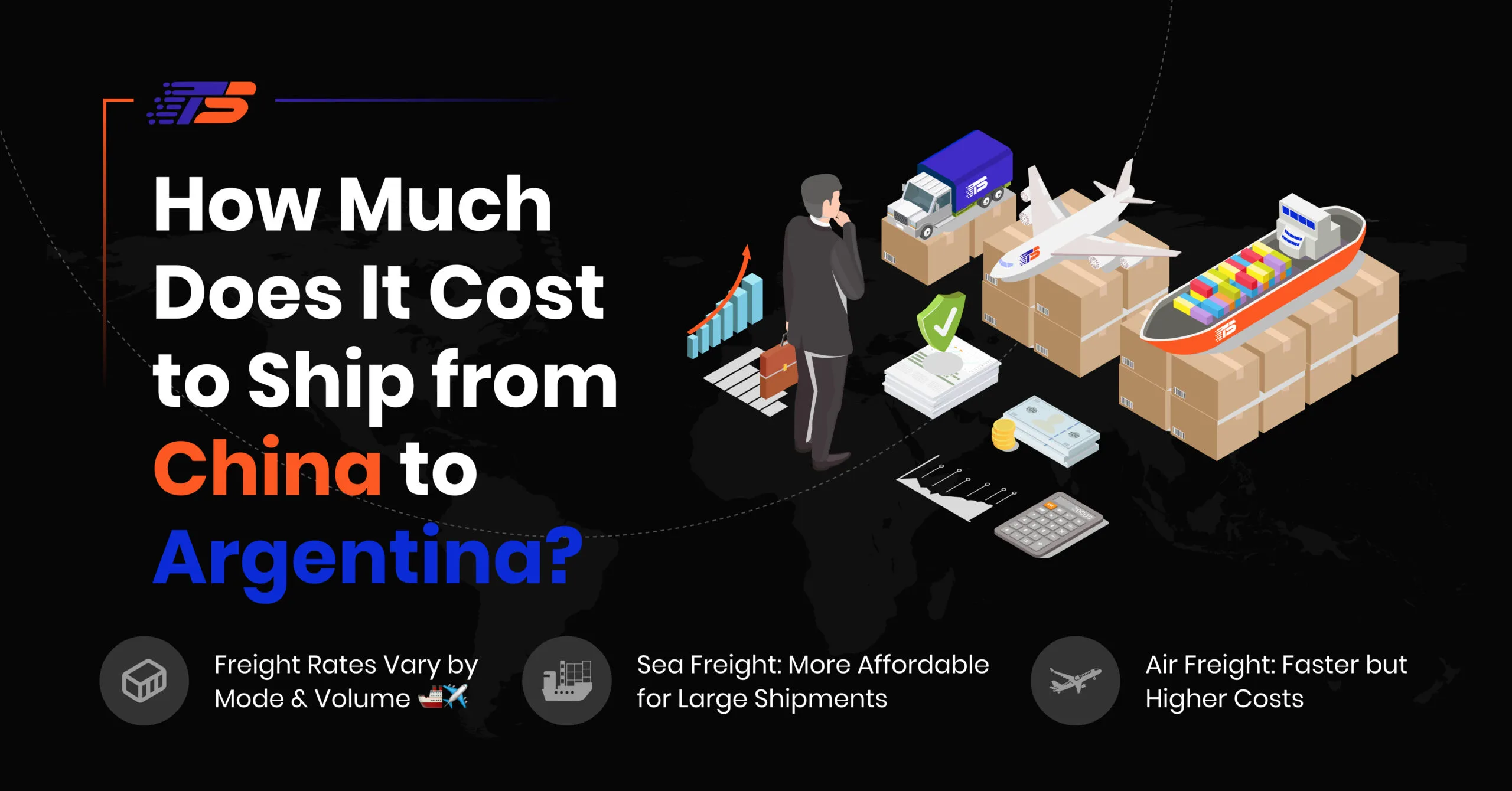
Factors Affecting Shipping Costs to Argentina
- Cargo Weight vs. Volume: Charges based on higher of actual weight or volumetric weight (length × width × height ÷ 5000 for air freight)
- Seasonal Fluctuations: Peak season (Oct-Feb) increases rates by 15-30% due to higher demand and limited capacity
- Fuel Surcharges: Variable surcharges of 10-25% applied based on current fuel prices and exchange rates
- Customs Duties & VAT: Argentine import duties range 10-20% by product category, plus 21% VAT on total landed value
- Currency Exchange: USD/ARS volatility affects local handling charges and can add 5-15% cost variations
- Port Congestion Fees: Buenos Aires port delays may trigger demurrage charges of $150-300 per day for containers
- Insurance Costs: Marine/air cargo insurance typically 0.3-0.5% of shipment value for comprehensive coverage
Strategic Shipping Routes China-Argentina
Strategic route selection optimizes transit times and costs for B2B importers. Understanding major hubs and connections ensures reliable supply chain planning and efficient cargo movement.
Major Origin Ports & Cities in China
- Shanghai: Leading container port with weekly services to Buenos Aires
- Shenzhen/Yantian: South China manufacturing hub with regular Argentina connections
- Ningbo: Major Yangtze River delta port serving electronics and machinery exports
- Guangzhou: Pearl River delta gateway for consumer goods and textiles
- Qingdao: Northern China port specializing in automotive and industrial equipment
Major Destination Ports in Argentina
- Buenos Aires Port: Primary entry point handling 70% of China imports, equipped for all container types
- Puerto de La Plata: Secondary option with shorter congestion times for bulk cargo
- Puerto Madryn: Regional port serving Patagonian distribution centers
- Puerto de Rosario: Inland river port via Paraná waterway for agricultural regions
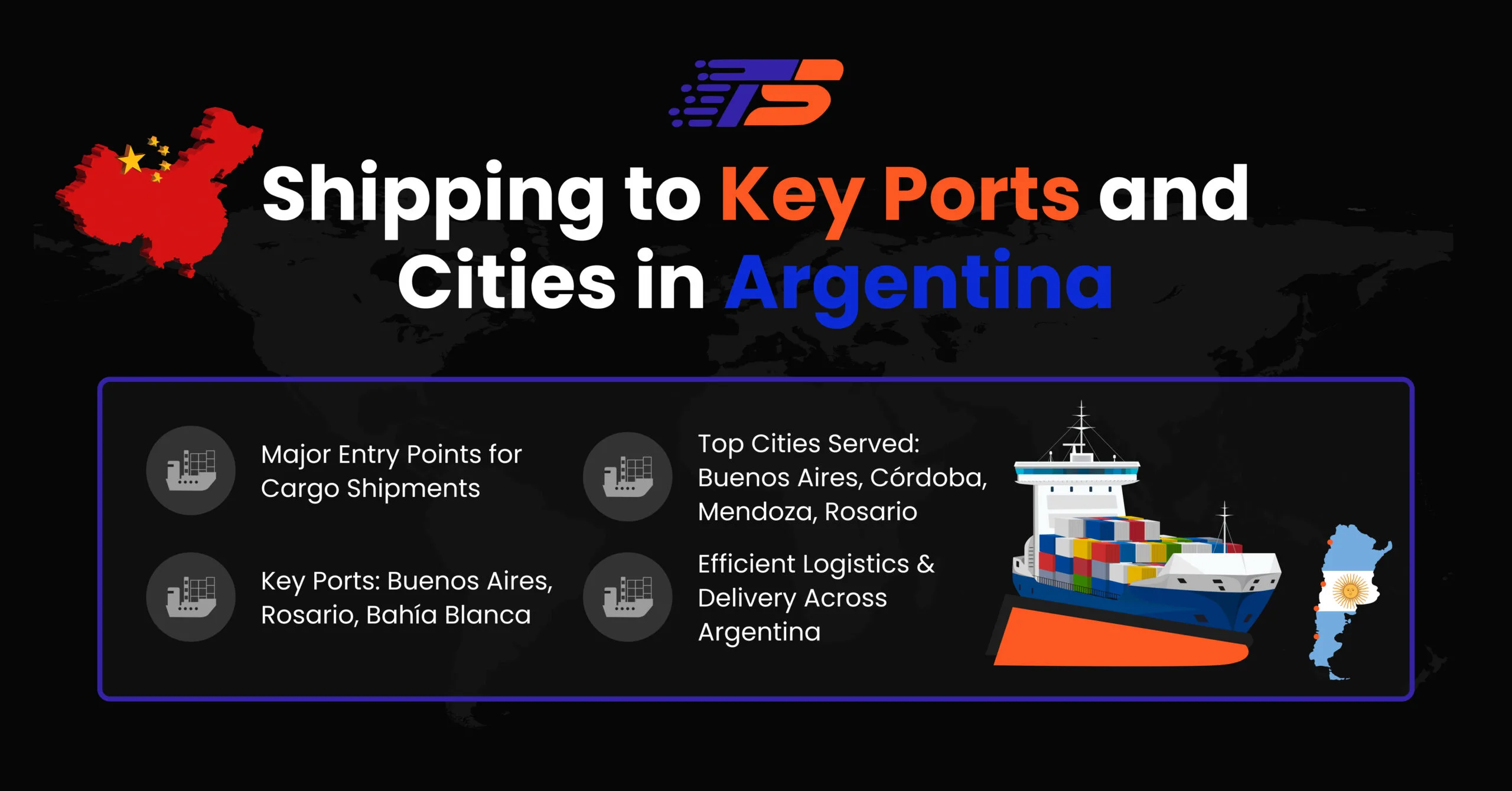
Most Popular Shipping Routes
| Route | Transit Time | Frequency | Best For |
| Shanghai → Buenos Aires | 35-40 days | Weekly | Consumer electronics, machinery |
| Shenzhen → Buenos Aires | 38-42 days | 2x weekly | Manufacturing goods, textiles |
| Ningbo → Buenos Aires | 36-41 days | Weekly | Automotive parts, industrial equipment |
Major Air Freight Hubs
China Airports:
- Shanghai Pudong (PVG): Largest cargo airport in mainland China, 3-4 million tons annually
- Beijing Capital (PEK): Northern China’s primary international freight hub
- Guangzhou Baiyun (CAN): South China gateway with extensive cargo facilities
- Shenzhen Bao’an (SZX): Manufacturing belt’s main air freight terminal
Argentina Airports:
- Buenos Aires Ezeiza (EZE): Primary international gateway for air cargo from China
- Buenos Aires Jorge Newbery Airfield (AEP): Secondary option for smaller shipments
- Córdoba Airport (COR): Regional hub serving central Argentina
Customs, Duties & Insurance for China-Argentina Shipping
B2B importers must navigate Argentina’s complex customs environment to avoid delays and unexpected costs. Understanding duty structures and choosing appropriate shipping terms ensures smooth clearance and predictable landed costs.
Argentine Customs & Import Duties
- Import Duty Rates: 0% to 35% depending on product category, with most consumer goods at 10-20%
- VAT (IVA): 21% standard rate on CIF value, 10.5% for essential goods
- PAÍS Tax: Additional 7.5% on most imported goods (excludes pharmaceuticals)
- Statistics Fee: 3% of CIF value for statistical purposes
Easily estimate import duties and taxes before shipping. Our Import Duty and Taxes Calculator helps you plan costs, avoid surprises, and make informed decisions for your shipments.”
Top Customs Tips
- Complete Documentation: Commercial invoice, packing list, certificate of origin, and detailed product descriptions prevent clearance delays
- Accurate Valuation: Declare true commercial value; undervaluation triggers inspections and penalties
- HS Code Precision: Use correct 8-digit Harmonized System codes to avoid duty miscalculations and delays
- Pre-Clearance Setup: Register with AFIP (tax authority) and obtain CUIT number before first shipment arrival
- Local Agent Requirement: Mandatory customs agent representation for all commercial imports over $1,000
Cargo Insurance Protection
Comprehensive cargo insurance protects B2B importers against losses during extended transit times on the China-Argentina trade route, covering physical damage, theft, and delays.
Coverage Options:
- All Risk Marine Insurance: Complete protection at 110% of CIF value
- Institute Cargo Clauses (A): Broadest coverage including theft, water damage, breakage
- War & Strikes: Protection against political risks and labor disputes
- Door-to-Door Coverage: Full transit protection from Chinese supplier to Argentine delivery
Premium Rates:
- Ocean Freight: 0.15-0.35% of cargo value
- Air Freight: 0.08-0.25% of shipment value
- Electronics/High-Value: 0.25-0.50% due to theft risk
- Standard Goods: 0.10-0.20% for manufactured products
HS Code Classification
HS codes are mandatory product classification numbers that determine import duties and regulatory requirements for all China-Argentina shipments.
Essential Information:
- Format: 8-digit system (first 6 digits international, last 2 digits Argentina-specific)
- Usage: Required on all commercial invoices and customs documentation
- Common Categories: Electronics (HS 85), Machinery (HS 84), Textiles (HS 61-63), Auto parts (HS 87)
- Duty Rates: Range from 0-35% based on HS code classification
- Penalties: Incorrect codes result in 50-200% duty penalties and shipment delays
- Customs Verification: Argentine authorities cross-reference declared values with similar imports
Simplifying Incoterms for China-Argentina Shipping
- FOB (Free on Board): Buyer controls shipping and assumes risk after Chinese port loading
- CIF (Cost, Insurance, Freight): Seller pays shipping to Argentina; buyer handles customs clearance
- DAP (Delivered at Place): Seller delivers to Buenos Aires port/airport; buyer clears customs
- DDP (Delivered Duty Paid): Seller handles everything including Argentine customs and duties
DDP vs DDU | Choosing the Best Shipping Terms from China to Argentina
DDP (Delivered Duty Paid)
- Seller handles all customs clearance, duties, and taxes
- Higher upfront costs but predictable total landed price
- Best for: Small importers, urgent shipments, first-time buyers
DDU (Delivered Duty Unpaid)
- Buyer pays import duties, taxes, and manages customs clearance
- Higher upfront costs but predictable total landed price
- Best for: Small importers, urgent shipments, first-time buyers
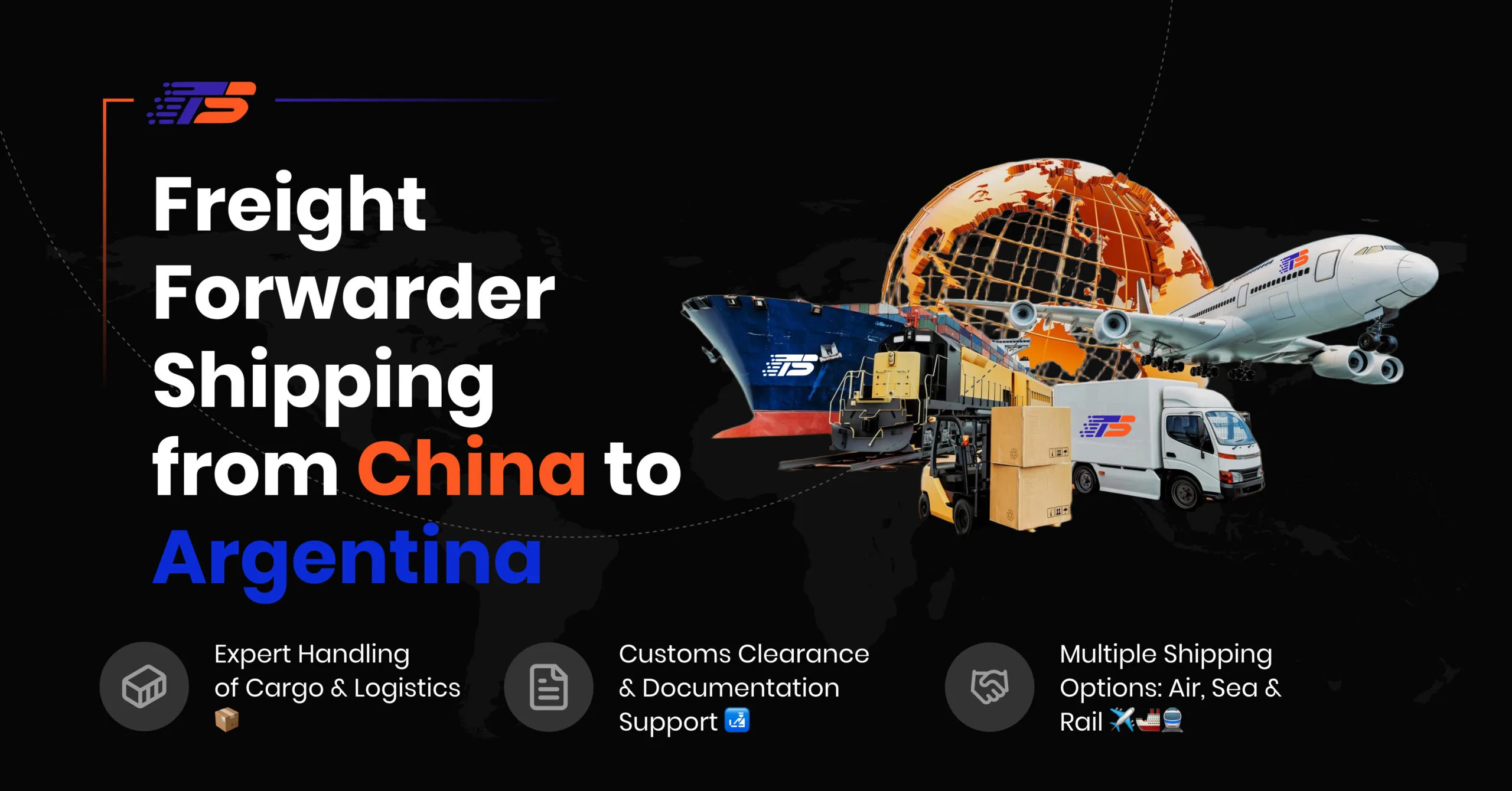
Professional freight forwarders streamline logistics operations, reduce shipping costs, and navigate Argentine customs regulations for importers handling regular shipments between Chinese manufacturing hubs and South American markets.
How to Choose the Right Freight Forwarder
Freight forwarders for the China-Argentina route should hold proper licenses such as a China Business License, NVOCC, and IATA certification, and have established partnerships with Argentine customs brokers. They need 3-5 years of experience handling shipments on this lane, expertise in your product category, and the capacity to manage everything from samples to full container loads, including Buenos Aires port operations.
Key service capabilities include multi-modal shipping (air, sea, express), door-to-door logistics, real-time tracking, and cargo insurance. Financially stable forwarders with global shipping partnerships, local presence, and verified B2B references are preferred, while unusually low quotes, missing certifications, poor communication, or lack of customs procedures are red flags.
Real-Time Shipment Tracking from China to Argentina
Monitor your shipping from china to Argentina journey from pickup to delivery with TopShipping’s advanced tracking system. Get instant updates, proactive notifications, and complete visibility throughout your china to Argentina shipping process.
Multi-Platform Tracking Integration
- Single login for all shipment types (sea freight, air freight, express)
- Real-time updates every 2-4 hours during transit
- Mobile app and web portal access
- Multi-language support (English, Spanish, Chinese)
Tracking Coverage by Method:
| Shipping Method | Update Frequency | Key Milestones | ETA Accuracy |
| Express Courier | Every 2-4 hours | Pickup → Transit → Customs → Delivery | ±1 day |
| Air Freight | Daily updates | Departure → Arrival → Customs → Release | ±2 days |
| Container Shipping | Every 2-3 days | Loading → Departure → Arrival → Discharge | ±3 days |
| LCL Sea Freight | Every 2-3 days | Consolidation → Sailing → Arrival → Deconsolidation | ±5 days |
China to Argentina Key Considerations
Beyond standard shipping from china to Argentina, certain cargo types, volumes, and timing factors require special attention. Here’s what you need to know for smooth, compliant shipping.
Dangerous Goods Classification:
- Lithium Batteries: Classified as Class 9 dangerous goods, requiring UN3480/UN3481 labeling and specialized packaging
- Electronics with Batteries: Must follow IATA regulations for lithium metal and lithium-ion battery transport
- Chemical Products: Require MSDS documentation and hazmat certification for air and sea transport
- Medical Equipment: Need health ministry approvals and temperature-controlled shipping solutions
Special Handling Requirements:
- Temperature-Sensitive Goods: Pharmaceutical and food products require cold chain logistics with temperature monitoring
- Fragile/High-Value Items: Enhanced packaging, insurance coverage, and secured transport arrangements
- Oversized Equipment: Special permits, route planning, and port handling equipment coordination
- Live Animals/Plants: CITES permits, veterinary certificates, and quarantine facility arrangements
Strictly Prohibited Items:
- Explosive and flammable goods, weapons and ammunition
- Meat or meat products, milk and dairy products, fresh fruit and vegetables
- Trees, plants and plant products without permits
- Illegal drugs and controlled substances
- Historical, artistic or archaeological artifacts without special permits
Restricted Items (Require Permits/Documentation):
- Used medical equipment, used vehicles, remanufactured parts, used tires
- Medical products containing Nimesulide as active ingredient
- Telecommunications equipment (requires ENACOM certification)
- Textiles and clothing (subject to quota restrictions)
- Firearms and ammunition (special import licenses required)
Documentation Required for Restricted Items:
- Import permits from relevant Argentine authorities
- Product certification and testing reports
- Sanitary certificates for applicable goods
- Environmental compliance documentation
Final Review: China to Argentina Shipping
Get your shipments from China to Argentina moving with speed, reliability, and total confidence. Whether you need urgent delivery, cost savings, or the perfect balance, there’s a solution for every business: express air or courier services for 3-5 day delivery, sea freight LCL for small loads or full containers for bulk to save up to 70%, or standard air shipping for a smart mix of speed and affordability.
First-time importers can test the market risk-free, growing businesses can combine sea and air to manage inventory and urgent restocks, and established operations can maximize savings with full containers while using express for urgent orders. From electronics and samples to bulk goods and oversized machinery, every cargo type has the right method. Plan ahead around peak seasons, take advantage of transparent pricing, expert customs handling, and real-time tracking, and rest easy knowing every shipment arrives safely, efficiently, and on time letting you focus on growing your business, not worrying about logistics.
FAQ | China to Argentina Shipment
How much does it cost to ship to Argentina?
Ocean freight: $2,850 (20′) to $3,950 (40′) container. Air freight: ~$7.70/kg for 1,000kg+. Express courier: $12-18/kg for small packages.
What’s the cheapest way to ship from China to Argentina?
Ocean freight (sea shipping) is the most cost-effective option, especially for bulk shipments and non-urgent cargo.
Why is it so expensive to ship to Argentina?
Long distance (15,000+ km), limited direct routes, Argentine import duties (10-35%), VAT (21%), PAÍS tax (7.5%), and port congestion fees increase total costs.
How long does shipping take from China to Argentina?
Express courier: 3-7 days, Air freight: 7-12 days, Ocean freight: 30-50 days depending on origin and destination ports.
What’s the best shipping method from China to Argentina?
Depends on urgency and budget: Express for urgent shipments, air freight for time-sensitive goods, ocean freight for bulk/cost-effective shipping.
How much does it cost to ship 1kg from China to Argentina?
Express courier: $12-18/kg, Air freight: $7.70/kg (minimum 1,000kg), Ocean freight: Most economical for larger volumes.
How are shipping costs calculated from China to Argentina?
Based on actual weight vs volumetric weight, shipping method, fuel surcharges, customs duties, insurance, and seasonal demand fluctuations.
Do I need special documentation for China to Argentina shipping?
Yes: Commercial invoice, packing list, certificate of origin, HS code classification, and AFIP registration for customs clearance.

